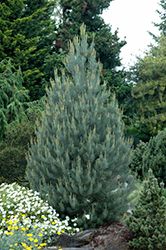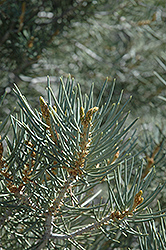Height: 30 feet
Spread: 20 feet
Sunlight:
![]()
Hardiness Zone: 5a
Other Names: Single-leaf Pinyon Pine
Description:
A small tree, often with several twisted trunks, low branching and a broad crown; single needles on stout brances are gray green, slightly curved and sharp-tipped; an excellent screen plant
Ornamental Features
Singleleaf Pinyon Pine is primarily valued in the landscape for its ornamental upright and spreading habit of growth. It has attractive grayish green evergreen foliage. The needles are highly ornamental and remain grayish green throughout the winter.
Landscape Attributes
Singleleaf Pinyon Pine is a multi-stemmed evergreen tree with an upright spreading habit of growth. Its average texture blends into the landscape, but can be balanced by one or two finer or coarser trees or shrubs for an effective composition.
This is a relatively low maintenance tree. When pruning is necessary, it is recommended to only trim back the new growth of the current season, other than to remove any dieback. It has no significant negative characteristics.
Singleleaf Pinyon Pine is recommended for the following landscape applications;
- Accent
- Hedges/Screening
Planting & Growing
Singleleaf Pinyon Pine will grow to be about 30 feet tall at maturity, with a spread of 20 feet. It has a low canopy, and should not be planted underneath power lines. It grows at a slow rate, and under ideal conditions can be expected to live for 80 years or more.
This tree should only be grown in full sunlight. It prefers dry to average moisture levels with very well-drained soil, and will often die in standing water. It is considered to be drought-tolerant, and thus makes an ideal choice for xeriscaping or the moisture-conserving landscape. It is not particular as to soil type or pH. It is highly tolerant of urban pollution and will even thrive in inner city environments. This species is native to parts of North America.
Disclaimer - This resource is provided for informational purposes only and does NOT reflect current availability. Inventory varies seasonally, so we cannot guarantee that every plant will be in stock at all times - please contact your favourite GardenWorks location directly for current availability. It does not include our entire inventory of plants, so be sure to visit GardenWorks to see varieties that may not be represented on this list.


